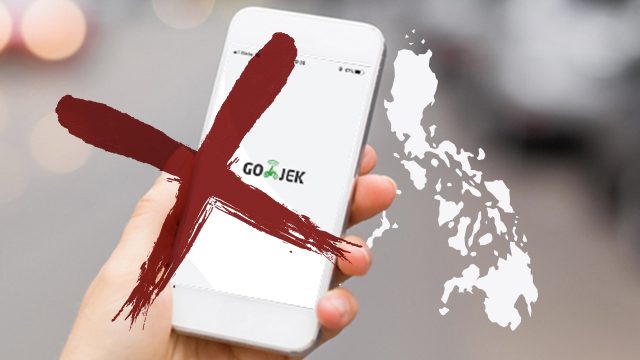SUMMARY
This is AI generated summarization, which may have errors. For context, always refer to the full article.

MANILA, Philippines (UPDATED) – The Land Transportation Franchising and Regulatory Board (LTFRB) has denied the application of Indonesian ride-hailing firm Go-Jek that would have allowed it to enter the Philippine market, sources confirmed.
The LTFRB issued Resolution No. 096 dated December 20, 2018 denying Go-Jek’s application, through its local subsidiary Velox Technology Philippines, as a transport network company (TNC) over foreign ownership issues.
“This committee resolves to deny applicant Velox Technology Philippines Inc’s petition for accreditation as a transport network company due to its failure to file a verified application as prescribed in the item (II) first paragraph of Memorandum Circular No. 2015-015-A dated 23 October 2017 and for being a foreign-owned corporation in violation of Section 11 Article XII of the 1987 Philippine Constitution,” the dispositive portion of the resolution said.
In a text message to Rappler, LTFRB pre-accreditation committee chairman Samuel Jardin confirmed that Velox’s application was denied. He said Velox can still appeal the decision. (READ: Will Indonesia ride-hailing giant Go-Jek enter PH?)
The resolution was signed by Jardin, and panel members Carl Marbella, Nida Quibio, and Joel Bolano.
Under the Constitution, franchise for public utility should be granted to Filipinos who own at least 60% of its capital.
Velox’s article of incorporation showed that it is 99.99% owned by its parent company Velox South-East Asia Holdings which is Singaporean.
This followed after the Department of Transportation issued Department Order (DO) 2017-11 in June 2018, which included transportation network vehicle services (TNVS) under modes recognized by the government as public transport.
Previously, DO 2015-011 under the Aquino administration – which allowed TNVS to operate – only “recognized” ride-hailing services as “new forms of transport services.” Uber at that time was mostly foreign-owned, registered at the Securities and Exchange Commission as a telecommunications service under “foreign stock.”
In a statement, Go-Jek said they will continue to work with Philippine government agencies to improve the transportation situation in the country.
“We continue to engage positively with the LTFRB and other government agencies, as we seek to provide a much needed transport solution for the people of the Philippines,” Go-Jek told Rappler.
Ride-hailing giant Grab Philippines continues to dominate, with new players still navigating the realities of breaking the “virtual monopoly” in the Philippine ride-hailing industry.
Currently, there are 8 accredited ride-hailing firms – MiCab, Hirna, Hype, Owto, GoLag, ePickMeUp, Snappy Cab, and Ryd Global – set to challenge the dominance of Grab in the market.
Grab became the dominant ride-hailing firm after it bought the Southeast Asia operations of Uber in March 2018. (READ: Months after Uber left, where are the new ride-hailing firms?) – Rappler.com
Add a comment
How does this make you feel?
There are no comments yet. Add your comment to start the conversation.